News
Why the road to Trump’s sentencing could be a wild ride

That Judge Juan Merchan has scheduled a Jan. 10 sentencing — and with no expected punishment — doesn’t mean this story is over.
In the wake of Judge Juan Merchan’s decision last week to preserve the New York hush money indictment and jury verdict against President-elect Donald Trump, my phone blew up with breathless questions like, “Will you be at the sentencing?” and “Do you think he’ll show?”
Not so fast, I told my family and friends. Merchan’s opinion, as well as Trump’s choice in appellate maneuvers, suggest to me — a former litigator and close observer of Trump’s hush money trial — that a Jan. 10 sentencing is no sure thing.
Merchan wrote like he’s running out of time
First, it’s not at all clear to me that Merchan actually expects to hold a sentencing hearing on Jan. 10 or at any other time. What makes me say this? His own opinion.
Indeed, given that Merchan wrote that his inclination is “to not impose any sentence of incarceration” and instead, to consider “a sentence of unconditional discharge,” which is legal speak for no penalty at all, as “the most viable solution,” you might be asking why Merchan would even schedule a sentencing. And there are likely a few reasons, including that a sentence is necessary in virtually all circumstances both to preserve a jury verdict and to enable a defendant to exercise his appellate rights.
On Friday on “Alex Wagner Tonight,” I posed a third possibility: that Merchan, knowing that even the Manhattan district attorney’s team no longer sees jail time as “practicable” given Trump’s countdown to becoming the 47th president, at least wanted to ensure that Trump, like any other convicted defendant, would have to stand before a court of law and listen to its strong, humbling description of his conduct.
But that’s when MSNBC legal analyst Kristy Greenberg, a former Manhattan-based federal prosecutor of many years, observed that sections of the opinion themselves sound like what judges say at sentencing proceedings. For example, rejecting Trump’s argument that the crimes for which he was convicted are comparably not so grave, Merchan castigated Trump for the “premeditated and continuous deception” that underlie his conviction on 34 counts of falsification of business records with the intent to defraud, including “an intent to commit or conceal a conspiracy to promote a presidential election by unlawful means.”
Throughout the opinion, Merchan also bemoans Trump’s lack of remorse, noting his “unrelenting and unsubstantiated attacks against the integrity and legitimacy of this process, individual prosecutors, witnesses and the Rule of Law” and observing that Trump has, on multiple occasions, “pursu[ed] a claim with increasing indignation while simultaneously failing to acknowledge that this Court’s rulings on those subjects have been repeatedly upheld.”
Do those words read as if Merchan understood, when calibrating his opinion, that because of Trump’s expected appellate efforts, this could be his last public statement in Trump’s case? They sure do.
What’s surprising about Trump’s appellate strategy
Speaking of Trump’s anticipated appeals, on Sunday he asked Merchan to stay all remaining proceedings — e.g., the sentencing hearing — in light of his intent to appeal on Merchan’s recent holdings. But the notice of stay filing underscores that while Trump himself is often predictable, his lawyers are not.
Many legal observers — present company included — thought Trump would turn immediately to the U.S. Court of Appeals for the 2nd Circuit (aka the federal appeals court for New York) for relief. After all, he already has a related appeal pending in that court.
But after waiting all weekend for a federal filing, we learned instead that Trump’s team has two state court rabbits up their sleeve: a direct appeal of Merchan’s post-verdict decisions to retain the verdict and indictment, and what’s known as an Article 78 proceeding, a New York-specific process through which government actors can be sued directly for deprivations of a litigant’s constitutional rights.
Does Trump genuinely believe he’ll fare better in “Blue York” appeals courts than he would before the 2nd Circuit, which, just a week ago, affirmed E. Jean Carroll’s first trial victory against him? On one hand, he’d be foolish to do so; Merchan’s Jan. 3 opinion, for example, noted that the narrow gag order in the hush money case has been upheld no fewer than eight times between the two New York state appeals courts with jurisdiction.
But focusing on who ultimately wins or loses ignores the bigger issue here: delay. All Trump needs is one or more judges of the Appellate Division, First Department — the applicable first-tier appeals court — to press pause on the sentencing until 12:01 p.m. on Jan. 20, when Trump becomes president once more. That’s also when, by virtue of taking the oath and for the duration of his term in office, Trump will again have immunity from any and all prosecutions and related proceedings.
And where temporary stays are concerned, the First Department hasn’t always been a disappointment for Trump. On the contrary, it has come through for Trump on a handful of occasions, including by granting a two-week stay of a gag order in another case, thereby freeing Trump to speak freely about the alleged bias of the judge in that case and his law clerk. Now imagine how a two-week stay of the sentencing in this case would serve Trump’s objectives even more clearly: Pausing the sentencing for two weeks would mean that Trump, who will again become president on Jan. 20 at 12:01 p.m., could not be sentenced, if at all, until Jan. 20, 2029, when he is no longer president.
Trump and his lawyers asked Merchan to tell them by 2 p.m. ET on Monday whether he intends to go forward with sentencing; otherwise, they vowed to “seek an emergency appellate review.” Indeed, by Monday evening, Merchan had denied their stay request, finding Trump’s arguments to be primarily “a repetition of the arguments he has raised numerous times in the past.” And Trump’s team had filed his Article 78 action, which accuses Merchan and Manhattan District Attorney Alvin Bragg of “serious and continuing infringement on his Presidential immunity from criminal process.”
Given this, I’m expecting a flurry of activity in New York appeals courts this week — and that none of it will end in a sentencing.
Watch this space.
News
“I think yes”: Biden believes he would have won election over Trump had he stayed in the race

When asked if his health would have held up to four more years of the presidency, Biden said “Who the hell knows?”
President Joe Biden thinks he had the juice.
The outgoing president speculated that he would have beaten President-elect Donald Trump a second time had he stayed in the presidential race in 2024. In a wide-ranging interview with USA Today, Biden was adamant that he would have fared better than Vice President Kamala Harris but balked on whether he could have served for four more years.
“It’s presumptuous to say that, but I think yes,” Biden told the outlet when asked if he would have won in November. “When Trump was running again for reelection, I really thought I had the best chance of beating him.”
Biden was less confident about making it through a second term. He said he considered “pass[ing] the baton” because he “wasn’t looking to be president when I was 85 years old, 86 years old.”
“Who the hell knows?” Biden said when questioned directly about whether he would have held his hypothetical presidency through 2028.
Elsewhere in the interview, Biden speculated about how his presidency would be remembered and advocated for what he viewed as the strengths of his administration.
“I hope that history says that I came in and I had a plan how to restore the economy and reestablish America’s leadership in the world,” Biden said. “That was my hope. I mean, you know, who knows? And I hope it records that I did it with honesty and integrity, that I said what was on my mind.”
News
BREAKING: Mexican President Claudia Sheinbaum Claps Back After Trump Suggests Renaming Gulf of Mexico to “Gulf of America” with Bold Renaming Proposal of Her Own!
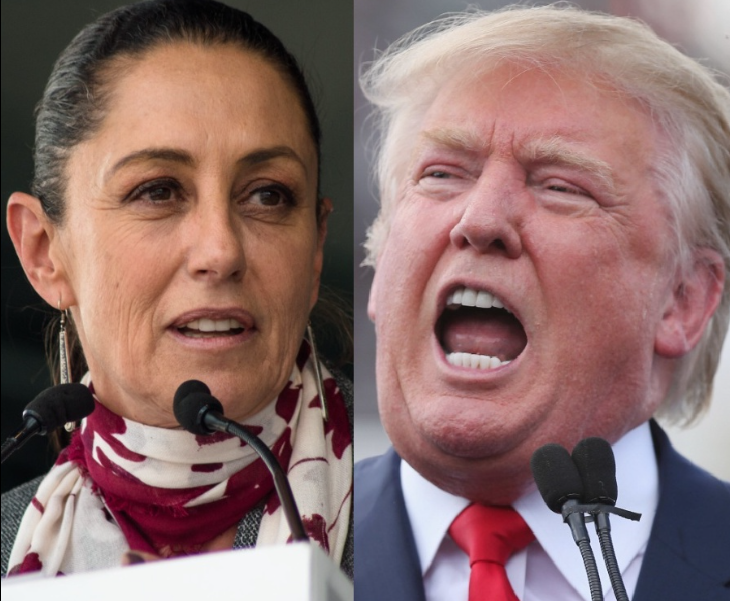
Mexican President Claudia Sheinbaum hits back hard after Donald Trump absurdly suggests renaming the Gulf of Mexico to the “Gulf of America” by suggesting some renaming of her own.
This is how you handle a man-child like Trump…
“I mean obviously, ‘Gulf of Mexico,’ the name is recognized by the United Nations, an organism of the United Nations. But next, why don’t we call it ‘Mexican America?’ It sounds nice, doesn’t it?” Sheinbaum said at a press conference.
She then waved at a map showing that North America was historically referred to as “Mexican America” before the rise of the United States.
“Since 1607 The Constitution of Apatzingán was for Mexican America, so we’re going to call it ‘Mexican America,’ it sounds nice, doesn’t it?” she went on. “And Gulf of Mexico, well, since 1607 and it’s also recognized internationally.”
Brian Winter, vice president of the Council of the Americas, praised Sheinbaum’s remarks—
“Humor can be a good tactic, it projects strength, which is what Trump responds to. It was probably the right choice on this issue,” he said.
“Although President Sheinbaum knows it won’t work on everything — Trump and his administration will demand serious engagement from Mexico on the big issues of immigration, drugs and trade,” Winter added.
Incidents like this reaffirm what a huge mistake the United States made be reelecting Trump. We are transitioning from stable, sane governance to the egomaniacal ravings of a reality TV star.
The world is laughing at us.
News
Trump’s trolling and tariffs sped up Trudeau’s demise. How will Canada handle him now?

Liberal Party infighting over Trudeau’s handling of the president-elect and his threat of tariffs dealt a final blow to the prime minister’s premiership. What now?
Canadians woke up Tuesday to an uncertain future, after Prime Minister Justin Trudeau said he would resign and bring his near-decade in power to an end.
Trudeau’s announcement came just days into an election year and followed weeks of mounting pressure from within his own party to step down as he battled dire poll ratings partly driven by soaring inflation, rising immigration and his handling of President-elect Donald Trump.
“If I’m having to fight internal battles, I cannot be the best option” in Canada’s next election, Trudeau, 53, told reporters in Ottawa.
His decision has triggered an urgent search within the Liberal Party to identify a new candidate who can take on Conservative leader Pierre Poilievre. Poilievre has dominated in the polls and was last on 44% according to the Canadian Broadcasting Corporation, compared with Trudeau — whose rating sits just above 20%.
The Trump factor
A key focus for whoever leads Canada next will be managing their country’s relationship with the incoming Trump administration.
After winning re-election in November, the president-elect vowed to impose a 25% tariff on all products imported from Canada and Mexico.
While Trudeau sought to appease Trump, visiting him at his Mar-a-Lago estate in Florida, the incoming president has since repeatedly jabbed at the prime minister, suggesting making Canada the 51st state and reiterating the idea in response to Trudeau’s resignation.
Trudeau’s handling of Trump precipitated the final blow to his tenure, with the high-profile departure last month of his Deputy Prime Minister and Finance Minister Chrystia Freeland. In a scathing resignation letter, she accused Trudeau of failing to take seriously Trump’s threats to increase import tariffs on Canadian goods.
Freeland warned that Canada needed to take Trump’s plans “extremely seriously” and avoid “costly political gimmicks.”
In contrast to Trudeau, Poilievre — the former-Conservative minister’s biography touts him as a “life-long conservative” and “champion of a free market” — has sought to present himself as the candidate with the “strength and smarts to stand up for this country.”
In an interview with Canadian broadcaster CTV News last month, Poilievre said that his first message for the incoming president was “that first and foremost, Canada will never be the 51st state of the U.S.” — and Canada, he said, had a “very proud future ahead of us.”
Tari Ajadi, a politics professor at McGill University in Montreal, was less sure. He told NBC News that Poilievre has yet to produce a clear plan on how to tackle the Canada-U.S. relationship under Trump, adding that “I think Canada’s in for a rough ride.”
What happens now?
Even though Trudeau is quitting, Canadians will have to wait for months before they can head to the polls.
An election date has yet to be announced, and while the Canada Elections Act says it must be held on or before Oct. 20, Trudeau’s resignation means it’s likely that a vote will be called before then.
Before that can happen, the Liberal Party must find a candidate. Trudeau said he would remain at the party’s helm until his party colleagues have undertaken a “robust, nationwide, competitive process” to find his successor.
In the meantime, Trudeau said Canada’s governor general had accepted his request to prorogue Parliament, suspending proceedings without the dissolution of parliament, until March 24. Then, a confidence vote is expected to be held, with a no-confidence result triggering the next federal election.
That means the Liberal government will remain in power, but parliamentary activity will come to a halt.
Referring to his party’s lack of working majority and Canada’s legislative gridlock, Trudeau said Monday that “Parliament has been paralyzed for months after what has been the longest session of a minority Parliament in Canadian history.”
Who will replace Trudeau?
Trudeau, a former teacher who campaigned with the slogan “sunny ways,” took office in November 2015 and enjoyed high popularity ratings early in his leadership with the promise of liberal reforms, progressive tax policies and a focus on gender equality.
His initial appeal was also boosted by the legacy of his father, the charismatic but polarizing Pierre Trudeau, who was one of Canada’s longest-serving leaders.
But in recent years, Trudeau’s approval ratings plummeted from around 65% in September 2016 to around 22% in December, according to the nonprofit Angus Reid Institute.
According to figures from the Angus Reid Institute, Freeland, a former journalist, is the Liberal candidate most likely to beat Poilievre.
Former Bank of Canada governor Mark Carney is also a contender, and the Conservatives have sensed that. They have long attacked Carney, with Poilievre dismissing him as “just like Justin.”
But regardless of who Trudeau’s successor is, “it’s hard to imagine anyone coming in who can hold on to the government in the next election,” Cornell University government professor Peter Loewen.
-

 News3 weeks ago
News3 weeks agoU.S. Military Service Is the Strongest Predictor of Carrying Out Extremist Violence
-

 Uncategorized3 weeks ago
Uncategorized3 weeks agoBREAKING: Kylie Kelce hits back hard after MAGA trolls swarm her with hatred for daring to dethrone Joe Rogan as the #1 podcaster in America.
-
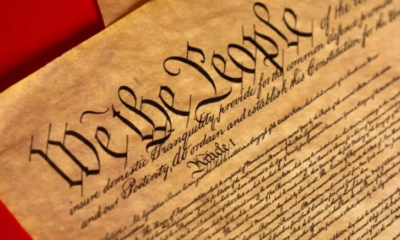
 News2 weeks ago
News2 weeks agoConstitutional Law expert: Trump will be an “illegitimate” President given he’s barred from office by 14th Amendment
-
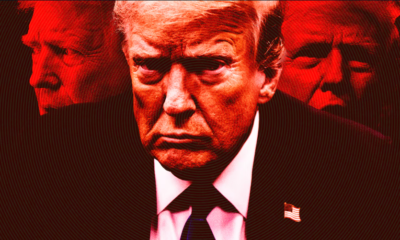
 News2 weeks ago
News2 weeks agoTrump Blames ‘Deranged’ Enemies for Hush Money Case in Posts
-

 News3 weeks ago
News3 weeks agoMerchan: Trump will be sentenced
-
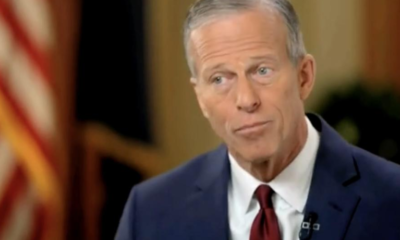
 News2 weeks ago
News2 weeks ago‘Is It Realistic?’: Top Republican Casts Doubt on Trump’s Deportation Quest
-
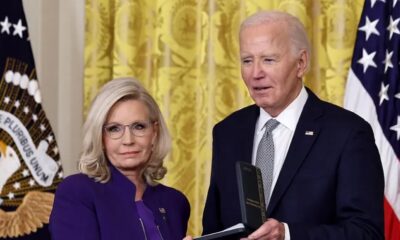
 News3 weeks ago
News3 weeks agoMAGA “offended” at Liz Cheney award
-
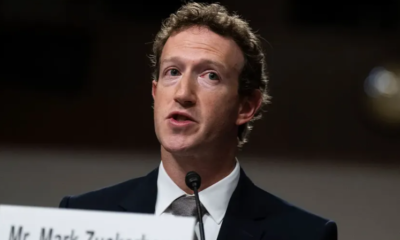
 News2 weeks ago
News2 weeks agoMark Zuckerberg tells Fox News that Meta will “get rid of fact checkers” in latest appeal to Trump






